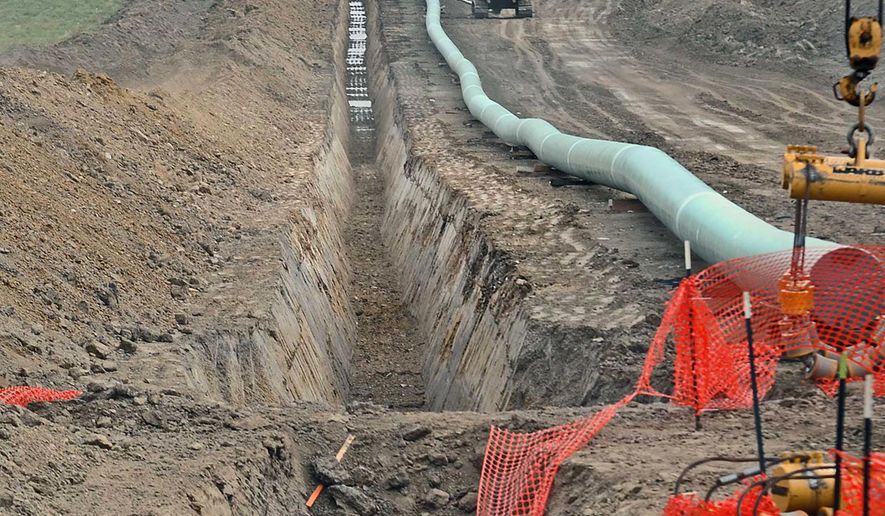Two anti-pipeline activists have been indicted on federal charges stemming from multiple 2016-17 attacks on the Dakota Access Pipeline in Iowa, including burning pipes and valves with torches.
Jessica Rae Reznicek and Ruby Katherine Montoya each face up to 40 years in prison if convicted on the nine criminal counts, including conspiracy to damage an energy facility, use of fire in commission of a felony, and malicious use of fire.
Ms. Montoya was recently arrested in Arizona, while Ms. Reznicek was released Monday pending trial Dec. 2 after appearing in federal court in Des Moines, according to U.S. Attorney for the Southern District of Iowa Marc Krickbaum.
The defendants were accused of conspiring to “knowingly and willfully damage and attempt to damage the property of an energy facility” at a cost that exceeded or would have exceeded $100,000, said the U.S. Attorney’s Office in a Tuesday press release.
Both women have made no secret of their efforts to sabotage the pipeline, appearing in a July 2017 video posted by Unicorn Riot in which they claimed responsibility for destroying construction equipment with gasoline, rags and tires; burning exposed valve sites, and attempting to piece portions of empty pipeline with torches.
Their goal was “to push this corporation beyond their means to eventually abandon the project,” said their statement posted on Unicorn Riot.
“Some may view these actions as violent, but be not mistaken,” said Ms. Montoya, wearing a “Stop the Pipeline” t-shirt. “We acted from our hearts and never threatened human life nor personal property. What we did do was fight a private corporation that has run rampantly across our country seizing land and polluting our nation’s water supply.”
After speaking to onlookers, they were shown being arrested by the Iowa State Patrol as they used hammers to tear down letters on the Iowa Utilities Board sign in Des Moines.
They expressed frustration over the lack of media coverage of the destruction, blaming Energy Transfer Partners, which built the pipeline, and the federal government for keeping the details from the public.
“These actions of great public interest were hardly reported, and the federal government and Energy Transfer Partners colluded together to lie and withhold vital information to the public,” said Ms. Reznicek.
BREAKING: Two women claim responsibility for sabotaging Dakota Access Pipeline, dismantle Iowa Utilities Board sign, then arrested #NoDAPL pic.twitter.com/wEQRTtwcrs
— Unicorn Riot (@UR_Ninja) July 24, 2017
Before launching their sabotage campaign in November 2016 on the night of the presidential election, they said they tried to stop the project by gathering signatures, testifying at hearings, and participating in civil disobedience, marches, rallies, hunger strikes, boycotts and encampments.
“Our conclusion is that the system is broken and it is up to us as individuals to take peaceful action to remedy it, and this is what we did out of necessity,” said Ms. Montoya.
Two Women Charged with Offenses Related to Pipeline Attacks https://t.co/PUKG0FefJt
— US Attorney S. Iowa (@USAO_SDIA) October 2, 2019
Thousands of activists descended on North Dakota for the massive 2016 anti-DAPL protest near the Standing Rock Sioux reservation, which failed to stop the pipeline but left behind 48 million pounds of trash and debris that was ultimately cleaned up by the U.S. Army Corps of Engineers at a cost of more than $1 million.
The U.S. Attorney’s Office emphasized that an indictment is only an accusation, and that the defendants are presumed innocent unless proven guilty.
U.S. District Court Judge Rebecca Goodgame Ebinger is slated to preside over the trial in Des Moines.
Energy Transfer Partners spokeswoman Vicki Granado said that the pipeline, which launched in June 2017, is “currently operating at its permitted rate of 570,000 barrels per day.”
“As Americans, we all have the right to lawfully express our opinions, regardless of who agrees with them,” she said in an email. “However, when those actions cross the line and become unlawful, that becomes an issue for law enforcement and our legal system.”
• Valerie Richardson can be reached at vrichardson@washingtontimes.com.




Please read our comment policy before commenting.